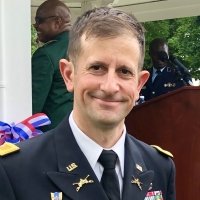Q: Describe your background and what brought you to the Wilson Center.
I am a Colonel in the U.S. Army, specializing in Russian and East European political-military affairs. I've served overseas in a variety of places in Europe, including Ukraine, Estonia, and Germany. As a 'military brat' growing up, I was exposed to international cultures at an early age and Eastern Europe has always been an interest for me, both from a professional and personal perspective. During my recent duty overseas, I have learned the value of our U.S. presence in these countries - both from a diplomatic and military angle - and have been impressed with the ability of our vast government apparatus to work constructively together, representing American values throughout. I've been immensely grateful for being exposed to perspectives coming from our allies and partners, and I enjoy approaching complex challenges in a multinational format. And I not only derived value from military relationships. One of the best decisions we made was to rent a dacha multiple summers outside of Kyiv. I still look back with tremendous affinity for that authentic experience, getting to know ordinary Ukrainians at their summer homes. I previously assisted a scholar at the Kennan Institute back in 2008 during my graduate studies at Georgetown University, and so Kennan seemed like a natural fit this time as I await assignment back overseas.
Q: What project are you working on at the Center?
My time here is short, but I am interested in the role and history of various uniformed ministries in the Russian Federation, especially the Armed Forces and the National Guard, within the framework of civil military relations. I am finishing a paper on the Russian National Guard and I will build on this research to examine particular personal and institutional relationships between military and political figures in Russia along with personnel issues that affect the armed forces, such as retention and recruiting. During my brief interaction with Russian officers, and despite the obvious differences between our countries, I have always found them to be largely professional in the execution of their duties. So what is this ‘professionalism’ based on? For me, it is important to understand the human factor in any Army - why people join, continue to serve, and eventually leave or retire.
Q: How did you become interested in your current research topic?
Like I mentioned above, I have had unique opportunities to work alongside other nations' military forces. Both in Ukraine and in Estonia, I came to learn that their respective forces were quite similar to the United States in many respects. Young men and women joined the Army for similar reasons, regardless of nationality. But over time, military leaders cultivated through the ranks acquire a distinct outlook based on the organizational culture of the institution in which they were raised. It also depends on the events that they live through. In Ukraine, for example, I witnessed how the Ukrainian Army transformed itself from a largely hollow force to a professional and competent fighting unit. I believe it is important to understand more the impact of this organizational culture on an Army, and how it changes over time.
Q: Why do you believe that your research matters to a wider audience?
Competitors often examine each other's capabilities and actions, since these are relatively easy to spot and analyze. But it is harder to understand the motivations for why military leaders act the way they do. In the very charged political climate surrounding Russia, this warrants more attention to guide current policy decisions.
Q: What is the most challenging aspect of your research?
The most obvious one is the difficulty in accessing Russian open sources that candidly and openly talk about these topics. Unlike the United States, Russia is still quite closed about these subjects. They are also understandably sensitive due to their military nature, but ironically it is this same closed nature that also leads Western observers to jump to the wrong conclusions.
Q: What do you hope will be the impact of your research?
Despite decades of competition and outright hostility between the Soviet Union and the U.S., we are in some ways no closer in generating widespread understanding of Russia and its place in the world. Furthermore, our own ability to discern nuances in Russia is hindered by the way we consume news here in the U.S. I hope my research represents one minor contribution toward breaking down preconceptions and contributes to principled and practical policies towards one of our greatest competitors.
The opinions and views of the author are his own, and do not represent those of the Department of the Army or Department of Defense.






